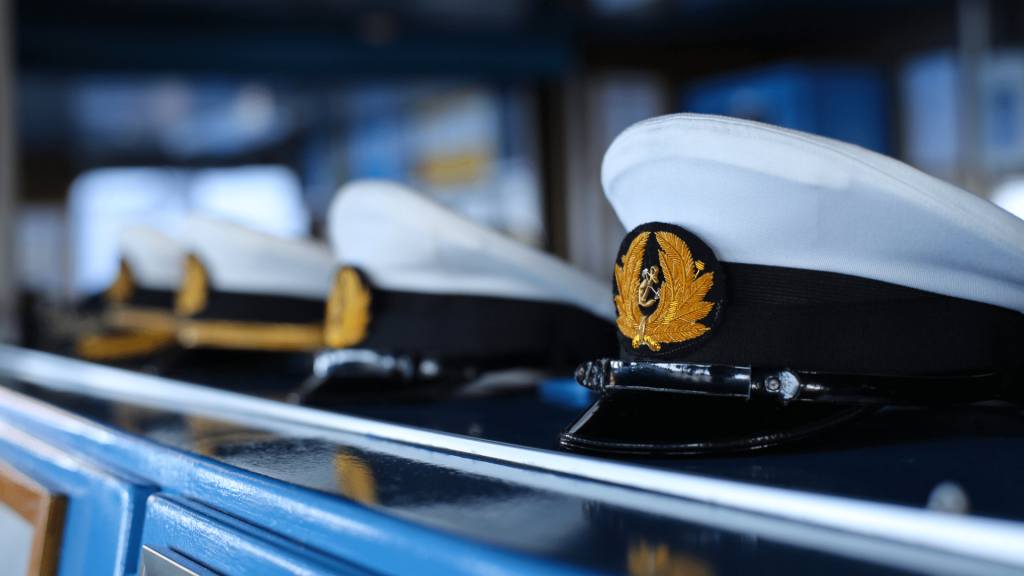If you find yourself wondering ‘how does a maritime cadet sponsorship work’ then you’re in the right place to get your answer.
A maritime cadet is an officer in training with the Merchant Navy—and association major maritime companies.
If you’ve spent any amount of time researching cadetships, you’ve probably come across some mention of maritime cadet sponsorships. Don’t worry if you’re not quite sure what this is all about—we’re here to help!
In this article, we will be answering all of your questions about maritime cadet sponsorships and explaining how you can secure one..
What Is a Maritime Cadet Sponsorship?
A maritime sponsorship is financial support that helps cover the costs of a maritime cadet’s training, living expenses, and other associated costs.
Sponsorships are awarded by shipping companies, or sometimes maritime academies, to their own internal candidates who they want to promote, or who may demonstrate financial need or have a strong academic record. In some cases, sponsorships may also be awarded based on an individual’s potential to contribute to the shipping industry in a meaningful way.
However, most shipping companies or maritime charity organisations recruit new cadets directly either by themselves or via UK Maritime & Coastguard Agency (MCA) approved “Training Providers (TP’s)” such as Chiltern Maritime.

What Kinds of Maritime Cadet Sponsorships Are There?
In general, there are two different kinds of maritime cadet sponsorships:
- Company Sponsorships
- Charity Sponsorships
Let’s take a closer look at both of these types of sponsorships.
1. Company Sponsorships
Companies in the Merchant Navy have a vested interest in cultivating a highly-skilled workforce. As such, many shipping companies offer maritime cadet sponsorship programs within their own fleets to encourage young people to pursue a career with them and in the maritime industry.
Company sponsorships typically cover the full cost of a maritime cadet’s training and the majority of living expenses, through a monthly Bursary. Once a student has passed their onshore training, and qualified, maritime cadets are typically offered employment with their sponsor company and required to work for a specified period of time if on a “tie in agreement” or released to seek employment with other companies.
At Chiltern, we’re proud to support the cadet sponsorship programs of a range of major maritime companies, including:
- TechnipFMC
- MSC Cruises
- Fred Olsen Cruise Lines
- NYK
- Condor Ferries
- Holland America Line
- Marella Cruises
If you apply for a sponsorship through Chiltern, you can submit an application to all the companies we’ve partnered with at once. Otherwise, you’ll need to apply to individual cadet sponsorship programs directly via company websites.
2. Charity Sponsorships
There are a number of charities that support maritime education and training through cadet sponsorship programs.
These programs are designed to support cadets who demonstrate financial need or exceptional skill and once qualified and have gained seagoing experience may wish to pursue a career in shore based organisations.
In areas such as Ship Building and Certification, Marine Authorities, Marine Certification & Compliance and Accident Investigation etc.
Some of the most well-known maritime charities that offer cadet sponsorships include:
You can apply to all four of these charities using Chiltern’s online application. However, it’s worth pointing out the charities vary in terms of selection criteria.
Before applying, it’s recommended that you read up on the specific requirements of each organisation.
How Do Maritime Cadet Sponsorships Work?
Maritime cadet sponsorships cover the majority of the costs associated with cadetship. This includes college course fees, seagoing initial Standards of Training, Certification and Watchkeeping (STCW) training courses, general expenses for related travel (to & from college and for joining leaving ships) and medical certification and visas that may be required. You should also expect to receive a monthly bursary between £700 and £1,000.
Amounts may vary according to company / sponsor. This is not a wage, as whilst on a cadetship you are classed as a student.
It’s a payment for work done whilst onboard ships (sea phases as part of your training) and to help with cost of living, accommodation, food etc whilst attending colleges.
Sponsorships are typically awarded for a specific period of time—usually the minimum amount of time required to complete onshore and offshore training, which depending on course can be 3 or 4 years. Generally Higher National Cert/Diploma’s (HNC/D’s), Foundation Degrees (FD’s) are 3 years, but Bachelor of Science (BSC’s) would be 4 years.
During this time, maritime cadets are typically required to maintain a certain grade point average (GPA), and follow all company and college requirements in order to keep their sponsorship.
All cadetships are college / university based and will be structured through 5 phases as follows: phase 1 at college, 2 phase 2 at sea, phase 3 at college, phase 4 at sea and phase 5 at college completing exams and qualification.
Note: as mentioned above if following a BSc college / university time will extend beyond phase 5 into a fourth year.
On completion of the cadetship all academic routes give the same outcome which is a “Officer of the Watch” qualification, The difference between HNC/D, FD and BSc is HNC/C is more hands-on training, FD and BSc is more academic based.
But completing a BSc at an early stage may assist with future promotions to higher levels that may require further academic training.
Regardless of academic level, with an “Officer of the Watch” certificate, after training companies who sponsor will seek to retain your services as a qualified officer ( and may have a “tie in clause” in your training agreement to retain your service for a short time) or if released, together with charity sponsored cadets all will be free to seek direct employment independently. This is often with companies who have supplied sea-time during your cadetship.
Before we go further and following above, we should point out that there are two levels of “Officer of the Watch” certificates. Limited and Unlimited. These are based on the type of vessels you will be trained on and in line with what you will be expected to work on.
Unlimited would be with training on and qualification to work on vessels over 3,000 gross tons. Small and large ships. Limited would be with training on and qualification to work on vessels smaller than 3,000 gross tons – such as small offshore vessels or Superyachts.
Most shipping companies unless they have specific needs or are in the Superyacht sector will train and require Unlimited certification.

Can You Self-Fund a Maritime Cadet Training Program?
Yes, it is possible to self-fund a maritime cadet training program. The reason that most people elect to seek out a sponsor is simple—security.
A sponsorship can assist with attaining a job waiting for you once you’ve completed your training. This can be a major relief for those who are worried about taking on the financial burden of a maritime education.
However, self-funding is still a viable option for prospective cadets. At Chiltern, we’ve helped dozens of self-funded cadets find placements with leading maritime companies. This is via our sister company Viking Crew, We can also provide advice on how to secure funding for your training program.
The UK maritime industry is expected to triple from 31,000 workers at present to 97,000 workers by 2030. That means there’s more than enough room for sponsored and self-funded cadets.
Find a Sponsor with Chiltern
At Chiltern, we work with a range of leading maritime companies and charities to bring you the latest cadet sponsorship opportunities. We also provide guidance on how to apply for sponsorships and how to self-fund your maritime training.
To learn more about our services or find out more about how a maritime cadet sponsorship work, get in touch with the Chiltern team today.